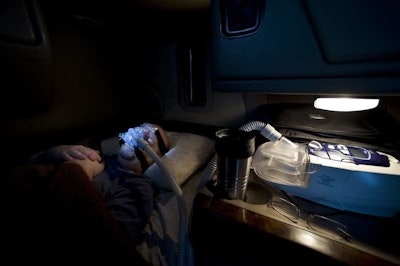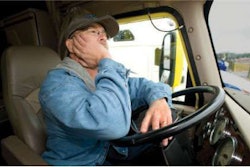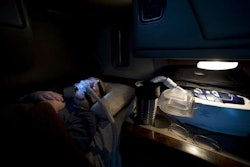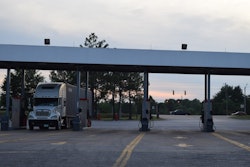 Sleep apnea recommendations have been made to railroad operators by the FRA, but FMCSA is standing by its previous position, despite a joint rulemaking between the agencies earlier this year.
Sleep apnea recommendations have been made to railroad operators by the FRA, but FMCSA is standing by its previous position, despite a joint rulemaking between the agencies earlier this year.Despite the Federal Motor Carrier Safety Administration and Federal Railroad Administration jointly issuing an Advanced Notice of Proposed Rulemaking on obstructive sleep apnea screening, the FRA issued Monday a set of sleep apnea-related recommendations calling for railroad companies to screen train operators for sleep apnea during their DOT-required medical exams.
FMCSA, however, says it will not follow FRA’s lead, despite the joint rulemaking initiative.
FMCSA spokesperson Duane DeBruyne said Monday the agency’s position on sleep apnea remains unchanged from 2013, which was that the agency “will issue a notice to address obstructive sleep apnea through the formal rulemaking process after collecting and analyzing the necessary data and research.”
FRA issued a safety advisory, published in the Federal Register Monday, as a response to a Sept. 29 train crash in Hoboken, N.J., that killed one person and injured more than 100 others. A New York Times report in November stated the train’s engineer had an undiagnosed case of severe sleep apnea.
In the advisory, FRA recommends that all train operators be screened for sleep apnea and other sleep disorders during their medical exams. FRA also recommends the development of “standardized screening tools, or a good practices guide, for the diagnosis, referral and treatment of sleep disorders (especially OSA)…to be used by company paid or recommended physicians during routine medical examinations.”
Additionally, FRA recommends rules that request operators to voluntarily report any sleep disorder that could affect their on-job performance.
FMCSA and FRA jointly issued an Advanced Notice of Proposed Rulemaking (ANPRM) earlier this year to collect information from the two industries on the prevalence of obstructive sleep apnea for people in safety-sensitive positions in each industry, like truck and train operators. The next step in the rulemaking process, a Notice of Proposed Rulemaking (NPRM), would likely give some direction as to what could be required of truckers. DeBruyne noted, however, that an “ANPRM may, or may not, lead to” a proposed rule.
Two of FMCSA’s advisory committees, the Medical Review Board and its Motor Carrier Safety Advisory Committee, issued final recommendations to the agency in October regarding which drivers should be screened for OSA. Truckers with a Body Mass Index of 40 or higher would be flagged for screening and would receive a 90-day medical certification, during which time they would have to have an in-lab or at-home sleep study done. If diagnosed, the drivers would have to begin treatment within that same 90 days. The boards also recommended truckers with a BMI 33 or higher would be subject to screening if they met three other qualifiers, which can be seen here.












